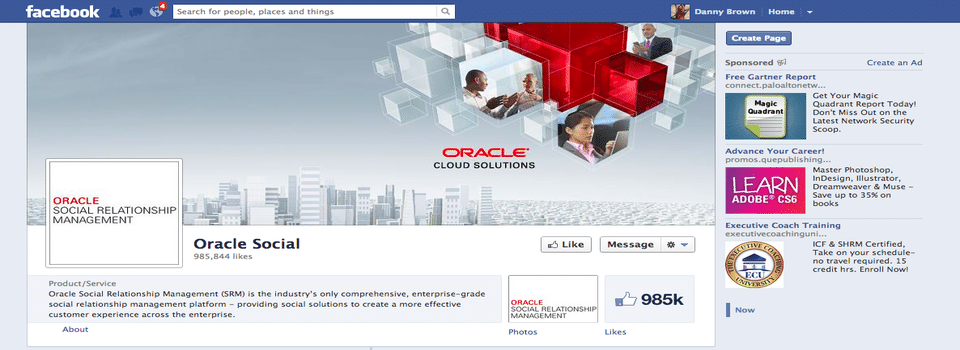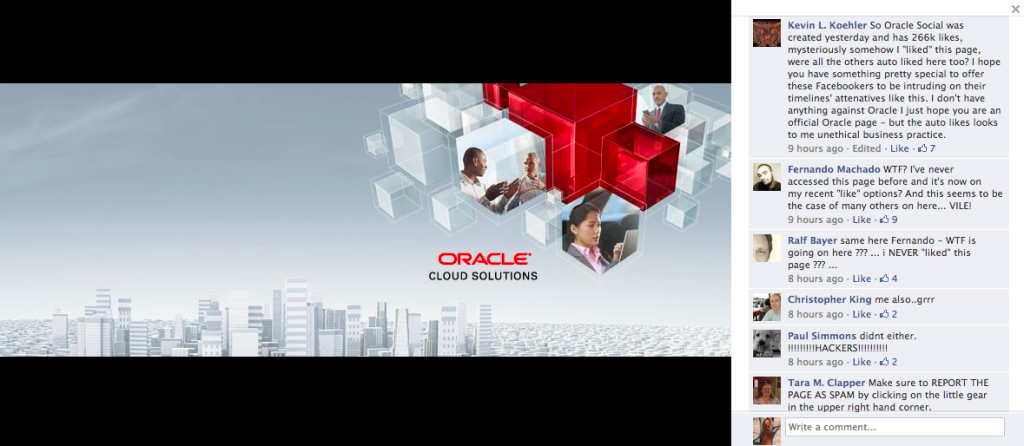
Oracle is a well-respected brand when it comes to solutions for I.T as well as social media and business intelligence for enterprise users. They have a collection of toolsets that cover everything from loyalty programs to service management and analytics.
So you’d expect them to have a fairly robust social media strategy for themselves, right? Except when it comes to Facebook, it would seem.
Late last night, my friend Aaron Lee messaged me to point out something weird going on with a new Facebook Page, Oracle Social. Aaron’s question piqued my interest:
Hey Danny, you “liked” Oracle Social as well. Was it an auto like too?
My answer back was no, I hadn’t, to which Aaron replied neither had he. Or the friends of his that suddenly seemed to like the page. When I looked at the page in more detail, I also noticed that 74 friends of mine liked it too. I asked several of them if they had, and they replied no.
As I was chatting with my friends about the page, something odd was happening all the while – the amount of Likes the page had was skyrocketing, even as we spoke.
When I was first alerted, they had 440,000 fans, despite only just being set up four days ago, on Wednesday November 7. Within 10 minutes, that had shot up to 475,000 – a huge jump in such a short space of time. At the time of writing this, they’re just under 1 million Likes.
That’s weird with a capital W. So just what’s going on, considering all the fast Likes as well as multiple complaints on the Page that people were added without permission? There are a few scenarios.
1. Oracle Bought a Crapload of Likes
There are several companies online that, for a fee, will provide you with thousands of social likes and follows. Fans on Facebook, views on YouTube, followers on Twitter, etc. Businesses often carry out this practice to make them seem more popular, especially when it’s a brand. However, these are usually crappy bot followers, not real people like the ones complaining loudly on the Oracle page. So, this seems unlikely.
2. Oracle Paid Facebook to Create a Large Fanbase for Them
Facebook is under a lot of pressure to show viable monetization solutions, especially given the lacklustre performance of their share price since the IPO earlier this year. It could be that enterprise organizations like Oracle would perhaps pay Facebook a fee to connect folks that would use Oracle’s services, based on demographic and industry. However, this also seems unlikely as it’s something that goes against Facebook’s privacy policy.
3. Oracle are Consolidating and Transferring Other Business Fans
This seems the most likely answer. To boost their social media presence, Oracle bought social apps company Involver and Facebook data company Vitrue, and molded them into Oracle’s bigger social media practice for customers. Erwin Meester suggested that Oracle is merging all the accounts into one big Oracle Social page. Which, if that’s the case, asks some serious questions on brands and permissions.
People are Not Properties
There’s a saying that if you aren’t paying for the product, then you are the product. It’s particularly specific to social media platforms, or media platforms where you get free access to certain services.
Essentially, by not paying to use Facebook, they (and the brands that pay them for access to you) can do whatever they like, and the only recourse if you don’t like this approach is to leave the service in question.
But should that also include automatic liking of a Page? I don’t think so. Even, as Erwin suggests, if you liked the page of a company that gets bought by another, that doesn’t mean you’re going to like the new company.
I used Involver’s YouTube app, so that was my connection to them. BUT, I had zero connection to Oracle. I’ve never used their service and I’ve certainly never liked any of their Facebook pages. And yet, there I was, a fan of the brand new Oracle Social page.
This is wrong, and a crappy approach to marketing. As a customer of Involver, I get my service use may be transferred to Oracle if I was to continue using the original platform. But that’s my choice as a paying customer. What was not my choice was the automatic like of a page I have no interest in.
Some of the things that should have happened include public updates on the Pages to be affected; a social outreach (heck, Oracle has the resources to do so); and emails to paying customers. These are just three solutions. Think about updating websites with big bold messaging on company landing pages too. There’s a lot that could have been done.
But just bringing all the fans onto one page whether they wanted to be there or not? That stinks and is a very poor strategy by Oracle, if this is indeed what’s happening.
Social is a Smart and Questioning Place
If you head on over to the Oracle Social page, you’ll see over 60 complaints (and rising) about adding people that had no previous connection to Oracle. And that’s just on the page.
Across personal profiles on Facebook, people are talking about the poor strategy around the whole incident. Amy McCloskey Tobin, owner of Ariel Marketing Group, raised a valid point when she asked where the Community Managers were, to answer the fire storm that was taking place in the page’s feed.
I reached out to three of the Twitter accounts associated with Oracle, and also emailed Kimberly Pineda, Director of Communications at Oracle, to try and find out exactly what was happening and if they thought it was a good idea to use the practice of non-permitted likes. So far, no response.
Here’s the thing. Social media has continuously proven that if you do something weird or questionable, it will usually blow up in your face. Forcing people to like a brand they may have no interest in whatsoever is not the smartest thing to do.
When you do it in the very small hours of the morning at the weekend, it also comes across as surreptitious, and makes you (the brand) look even worse, as is evident in the comments over on the Oracle Social wall.
If this is consolidation, it would have been a good idea to publicly advise, via social updates and emails, what was about to happen, and offer the opportunity to opt out before being set up as a fan of a non-relevant brand.
It’ll be interesting to get Oracle’s take on this. I’ll keep you posted.
Further reading: Bad Social Practices Blow Up in the Middle of the Night
Update 1 – 9.41am EST November 10: According to a source close to Oracle, they’re merging Pages and working with Facebook on this. Still no official word or answers to the questions on the Oracle Social page.
Update 2 – 11.00am EST November 10: Oracle has just posted an explanation and apology on their Facebook Page.
Update 3 – 12.16pm EST November 10: Oracle has just posted a “welcome” to confused users on their Facebook Page.





I agree with you. Automatic likes have an undermining effect on the free and transparant communication that social media try to offer.